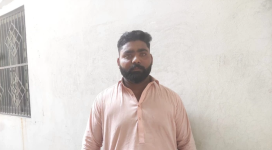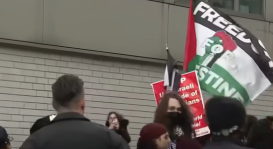JAKARTA, Indonesia – The suicide bombing of a church in Central Java on Sept. 25 pointed not only to a new level of attacks on religious minorities in the world’s largest Muslim-majority country but to a political bent that accommodates Islamist extremism.
“Radicalization of Islamic teachings and understanding is a problem in Indonesia,” admitted Dr. H. Nasaruddin Umar, director general of Islamic Community Guidance under the Ministry of Religious Affairs. “There’s a need to re-explain the concept of jihad.”
Pino Damayanto, aka Ahmad Yosepa Hayat, who blew himself up wounding over 20 members of the Sepenuh Injil Bethel Church (Bethel Full Gospel Church) in Solo on Sept. 25, apparently believed it was his religious duty to kill “the enemies of Islam,” according to his understanding of “jihad.”
National Police spokesman Anton Bachrul Alam linked the 31-year-old bomber to the Jamaah Ansharut Tauhid (Partisans of the Oneness of God or JAT), a terrorist group believed to be founded three years ago by Abu Bakar Bashir. Bashir is serving a jail term for terrorism.
Bashir is well-known among the security apparatus in the United States. He is seen as close to al Qaeda and alleges that the U.S. Central Intelligence Agency and Israel’s Mossad have carried out “false flag” attacks in Indonesia and elsewhere.
The Indonesian government can be expected to crack down on groups such as the JAT, as the United States is among the largest investors in Indonesia, and President Susilo Bambang Yudhoyono values his reputation in the West.
“He’s a darling of the West,” a senior journalist from The Jakarta Post told Compass.
Washington’s war against terror has stakes in Indonesia, which came to light after the 2002 Bali bombings by the al Qaeda-linked Jemaah Islamiyah group, of which Bashir is seen as the spiritual head. Bashir is co-founder of an Islamic boarding school, Al-Mukmin, near Solo. People linked to Bashir’s school have been implicated in terrorist attacks.
Dealing with terrorists alone, however, may not help much. Extremism that breeds terrorism needs to be checked, hinted the Wahid Institute’s Rumadi, who uses a single name. The Wahid Institute works towards “a just and peaceful world by espousing a moderate and tolerant view of Islam and working towards welfare for all.”
There are extremist groups in Indonesia that are not known to have exploded bombs, but they practice violent moral policing and persecute minorities, sometimes beating members of minority communities to death. According to a human rights group in Jakarta, the Setara Institute for Democracy and Peace, there were at least 75 incidents, including violent attacks, violating religious freedom of the Christian community in 2010.
The most prominent name among these violent extremist groups is the Front Pembela Islam (Islamic Defenders Front or FPI), according to the Setara Institute. The FPI was founded in 1998 by Saudi-educated Muhammad Rizieq Syihab. These groups oppose the doctrine of “Pancasila,” the Indonesian goal of “unity in diversity” in the Indonesian Constitution, which calls for religious freedom and democracy.
In March, an FPI member and eight others were convicted in the Sept. 12, 2010 clubbing of a pastor and the stabbing of a church elder of the Batak Christian Protestant Church in West Java. Christians and human rights activists, however, condemned the light sentences of only five to seven months.
A leaked U.S. diplomatic cable dated May 9, 2006, published on the WikiLeaks website in May, revealed that a member of the National Intelligence Agency told the U.S. Embassy that a top official of the national police had “provided some funds” to the FPI, and that police were using the hard-line Muslim organization as an “attack dog.”
Extremist groups and officials close to them flout laws and violate the rights of minorities with almost complete impunity, sources said. For example, the Yasmin Church in Bogor, a suburb of Jakarta, remains sealed by the city mayor, Diani Budiarto, despite a Supreme Court order against his action and recommendation by the ombudsman to give the church back to the congregation.
Sept. 18 was the deadline set by the ombudsman for the mayor to unseal the church, but it remains sealed, a church member told Compass.
“Higher authorities have taken no action against the erring mayor,” he complained, saying Indonesia’s largest Islamic party, the Prosperous Justice Party, known as the PKS, supported the mayor in the 2008 election. The PKS, which calls for a central role for Islam in public life, is seen as tacitly supporting some extremist groups.
Bonar Tigor Naipospos, vice-chairman of the Setara Institute, said his research shows that extremist groups have infiltrated at all levels, including the Majelis Ulama Indonesia (Indonesian Ulema Council or MUI), a clerical body representing all Indonesian Muslim groups to the government.
Thanks to the growing clout of extremist groups in street politics as well as in some mainstream Muslim organizations, the government seems to be extremely cautious in taking action.
“The government has no will to control extremist groups,” said Rumadi of the Wahid Institute, adding that the government of Yudhoyono, who was re-elected for a second five-year term in 2009, doesn’t want to be seen as “anti-Islamic.”
He also noted, “The issue of extremism diverts attention away from the high level of corruption in the government.”
The government shrugs off the threat from extremists, claiming they are tiny in number.
“Extremism in Indonesia has low support but high impact,” said Dr. Abdul Muti, general secretary of Muhammadiyah, the country’s second largest Islamic organization with more than 29 million members, mostly moderate.
The majority of the people in Indonesia say corruption is the country’s most serious problem. In June, Muhammad Nazaruddin, former treasurer of President Yudhoyono’s Democratic Party, was accused of graft involving 32 government projects worth 6 trillion rupiah, or US$700 million.
With a lack of will on the part of the government, extremism has constantly grown since the fall of the authoritarian President Suharto in 1999, who kept radical groups under control. A local Christian, a former member of the students’ movement that played a key role in the fall of Suharto’s government, said that while extremists used democracy to push their agenda, their goal was to eventually abolish democracy and establish an Islamic state.
Of Indonesia’s population of 232.5 million people, more than 80 percent are Muslims, mostly Sunnis, according to Operation World, which puts the Christian population at nearly 16 percent. The vast majority of Indonesian Muslims are moderates.
“However, if not checked, the radicals may turn the moderate Indonesia into another Pakistan or Afghanistan in the future,” the Christian warned.







